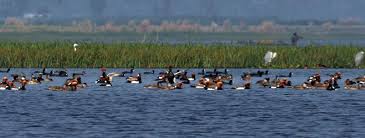Source: newsclick.in
Patna: Ten days back, the Gogabeel lake in Katihar district was declared as Bihar’s first Community Reserve. Nearly 250 villagers including farmers and tribals expressed their happiness and said that they have offered 140 acres of land to develop it as a bird sanctuary.
A local environmentalist T N Tarak said local villagers are happy and upbeat following the Principal Secretary, Department of Environment, Forest and Climate Change, Dipak Kumar’s notification declaring Gogabeel part (140.29 acre) as a Community Reserve and another part (73.78 acre) as the Conservation Reserve on August 2 .
Jeet Narayan Yadav, a retired defence personnel, who is residing in village near the Gogabeel lake, told NewsClick that local villagers, mostly farmers, have contributed to turn it into a community reserve and to develop it as a bird sanctuary. “We have offered our land for it,” said Yadav, one of the 250 villagers who offered their land for the development of Gogabeel lake into a bird sanctuary.
Another villager Mahesh Rai said, “We are happy as our long struggle has finally born some fruit as the authorities have accepted our request to conserve the Gogabeel lake for birds and biodiversity and declared it as the first and only community reserve as well as a conservation reserve in the state.”
Gogabeel is an ox-bow lake formed by rivers Mahananda and Kankhar in the north and Ganga in its south and east. Despite being ignored by the concerned government agencies for a long time, the lake survived due to the awareness and motivation of local enthusiasts and friendly villagers in collaboration with the members of Mandar Nature Club. It has now become the 15th Protected Area (PA) of Bihar.
Ram Kripal Kumar of Goga Vikas Samiti of Sura Par praised and lauded the villagers, by saying, “They have set an example by donating land to develop the wetlands as a reserve for local and migratory birds.”
“It was not at all easy to convince the villagers that the rights and management of this community reserve will remain with the local community. For this, the members of different organisations Goga Vikas Samiti, Janlakshya (Katihar), Mandar Nature Club and Arnav from Bhagalpur worked together hard for years. Janlakshya has adopted a local tribal village ‘Marwa’ organising different camps and programmes for them for ensuring the protection of Gogabeel Lake and its biodiversity,” said Dr. Raj Aman Singh, who is the treasurer of Janlakshya.
Arvind Mishra, state coordinator of Indian Bird Conservation Network (IBCN), and a member of IUCN Species Survival Commission said, “We are overwhelmed to find the first community reserve and conservation reserve of Bihar with the help and support of local villagers.”
Mishra said the proposal for notifying Gogabeel and Baghar Beel as ‘Community Reserve’ and ‘Conservation Reserve’ was passed in the meeting of State Board for Wildlife held on November 2, 2018. “We will request the government to similarly notify the adjoining wetland Baghar Beel which is no less than the Gogabeel lake,” he added.
According to Mishra, Gogabeel was initially notified as a Closed Area by the state government in the year 1990 for 5 years and this status was extended in 1995 up to 2000. After the amendment of the Wildlife Protection Act, 1972 in 2002, the provision of closed area has been omitted and this site disappeared from the list of the Protected Areas (PAs) of the state government of Bihar having no legal status.
But this wonderful birding site, including Baghar Beel and Baldia Chaur, was given the international status of an IBA (Important Bird Area of India) in 2004 and again in 2017 by the IBCN, a network of Bombay Natural History Society (BNHS), Bird Life International, UK and Royal Society for the Protection of Birds (RSPB), UK, on the recommendation of Mishra, who was a regular visitor to the area since the early 90s. He also recommended this site as having all potential for being declared as a Ramsar Site of India which found place in the book “Potential Ramsar Site of India” published by BNHS in 2008 in which eight wetlands of Bihar have been included. At present, there are 27 wetlands in India with global value and importance, which have been designated as Ramsar Sites.
Besides many scientific publications at national and international level Gogabeel finds mention in the book Ducks, Geese and Swans of India: Their status and Distribution published by BNHS and the bird count conducted by Mandar Nature Club, Bhagalpur has been recorded in the data zone of Asian Waterbird Census of Wetlands International since 1995.
Mishra said Gogabeel is a permanent water body, which shrinks to some extent in summer but never dries completely. “It may be a smaller water body of only 88 hectares but it supports unique assemblage off bird species both in count and diversity,” he said.
More than 90 bird species have been recorded from this site of which about 30 species are migratory. Among the threatened species, the Lesser Adjutant falls in the vulnerable category; and three species, the Black-necked Stork, White Ibis and White-eyed Pochard are under the near threatened category. Four of the Biom Restricted species are also found here. The site falls in Biome-12 (Indo-Gangetic plains) but many species of Biome 11 (Indo-Malayan Tropical Dry Zone) are also reported from this site. They include the Black Ibis, Ashy Swallow Shrike, Jungle Babbler and Bank Myna (Mishra, A. 2002). Some other bird species of interest are Red Munia, Northern Lapwing and Spotbill Duck which otherwise are not commonly seen in other wetlands of the state. The large flocks of Asian Openbill and White Ibis are the beauty of Gogabeel.
